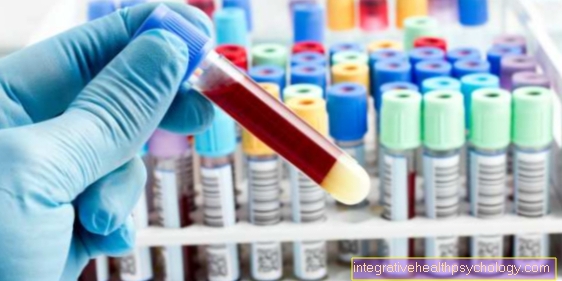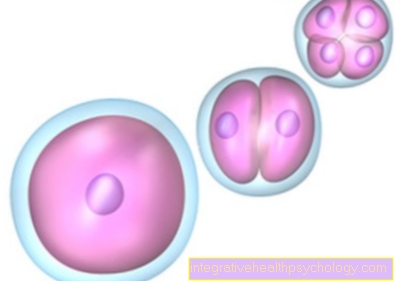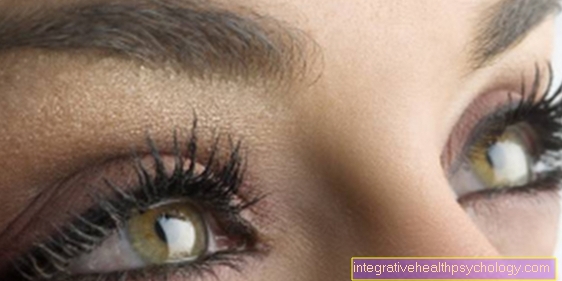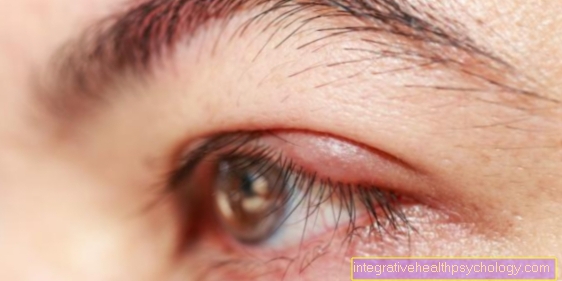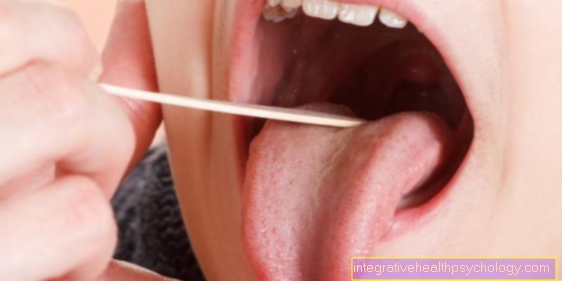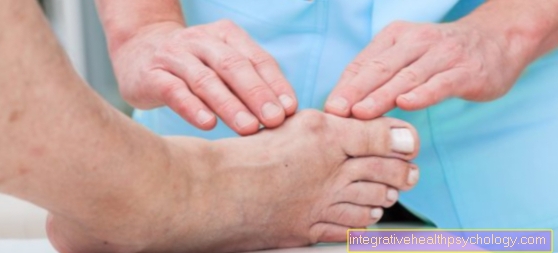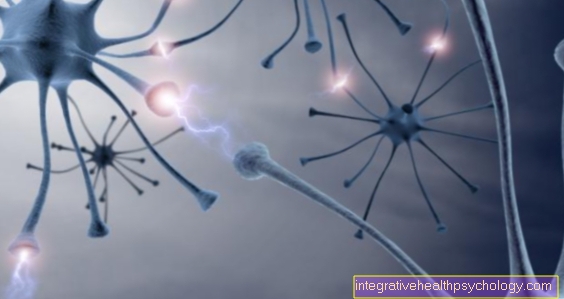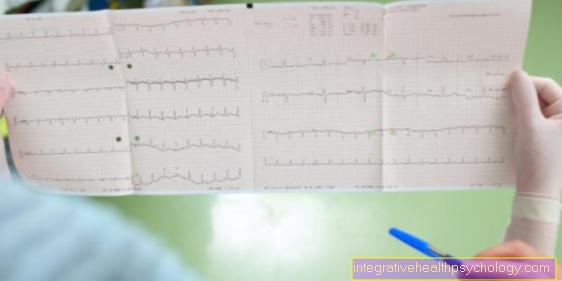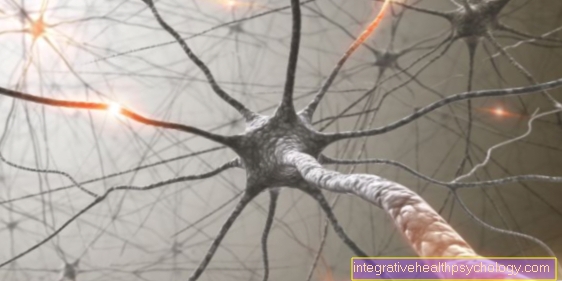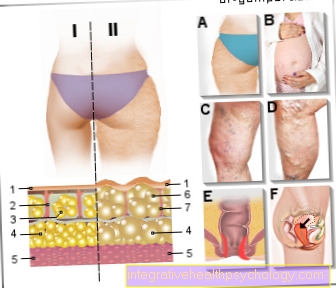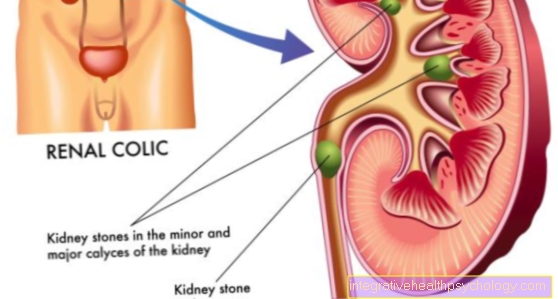Alcohol withdrawal
definition
Alcohol withdrawal is a measure that aims to achieve abstinence from alcohol.
It should be carried out in the case of an existing alcoholic disease and can be either voluntary or involuntary. Understanding the presence of alcoholism is often the first and at the same time the most difficult step that is required for alcohol withdrawal. In the course of alcohol withdrawal, there are various typical symptoms that can be very dangerous. It is therefore important to withdraw from alcohol within the framework of a medical connection and to receive psychotherapeutic supportive treatment.

How do I know if I need alcohol withdrawal?
There is no clear limit to the regular consumption of alcohol from which alcohol withdrawal is required. However, there are various signs that should make it clear to the person themselves and / or those around them that alcohol withdrawal is a sensible measure.
On the one hand, this includes a major limitation in everyday life. For example, if the person concerned does not get through the day without consuming alcohol and cannot do without drinking alcohol daily, this should be a concern. Drinking alcohol early in the day is also a sign of alcoholism. Morbid consumption of alcohol often leads to inappropriate behavior and a change in personality, which affects relationships with other people and possibly also the work of the person concerned.
In addition, there are various symptoms of alcoholism that should also be viewed as warning signs. These include, for example, a regression of the muscles, also known as muscle atrophy, increased sweating, sleep disorders and later rhythmic jerks and gait disorders.
All of these are signs that alcohol withdrawal would be useful in order to improve the quality of life of the person concerned.
What are typical withdrawal symptoms?
With alcohol withdrawal, various symptoms can occur, which are also often referred to as withdrawal symptoms. They arise from the usually relatively abrupt withdrawal of alcohol from the body.
This withdrawal symptom can be very pronounced, especially with long-term alcohol consumption and pronounced alcohol dependency and illness, which makes medical care very important. In this way, possible life-threatening consequences of alcohol withdrawal can be avoided.
Typical withdrawal symptoms include various vegetative symptoms:
- Increased heart rate
- High blood pressure
- Increased sweating
- Tremble
- Seizures
- nausea
- a headache
- fatigue
There are also various typical withdrawal symptoms that are psychological:
- Difficulty concentrating
- internal restlessness
- sleep disorders
- Anxiety
- Hallucinations
- depressions
Another possible form of alcohol withdrawal is what is known as “delirium tremens”. Those affected are often very disoriented and can be easily over-excited, i.e. show a strong reaction to a stimulus that is not so strong.
Read more on the topic: Effect of alcohol
Alcohol withdrawal headache
One of the first classic symptoms of alcohol withdrawal is a headache.
These appear a few hours after withdrawal and can be very pronounced. When alcohol is consumed, it is also built into the nerve cells of the brain. This creates a disruption in communication between the cells. If the alcohol is broken down again and no new one is added, the breakdown products also collect in the nerve cells in the brain. This causes severe headaches.
Is fatigue normal with alcohol withdrawal?
Withdrawal from alcohol often leads to tiredness and exhaustion during the course of withdrawal.
Alcohol often has a negative impact on sleep patterns, which leads to a restless sleep structure. Sleep is no longer as restful for the body as it is busy breaking down alcohol. This leads to constant tiredness during the first few days of alcohol withdrawal due to the still disturbed sleep structure. The affected people often feel exhausted and weak and do not have as much energy as they are used to.
Alcohol withdrawal cramp
A possible accompanying symptom of alcohol withdrawal is the so-called alcohol withdrawal cramp. This is excessive, rapid tension in the muscles all over the body.
Most of these are epileptic seizures, and often grand mal seizures. These are caused by an incorrect regulation of the electrolytes in the body, which have been unbalanced by regular alcohol consumption. If such seizures occur, it is especially important that treatment and monitoring be carried out in a medical facility.
Read more about this: Symptoms of epilepsy
sweat
With alcohol withdrawal, sweating is one of the classic accompanying symptoms.
This is due to the fact that the so-called vegetative functions, i.e. the regulations controlled by the body itself, are disrupted. This often leads to increased sweating. Sweating is also related to disturbed sleep behavior. Often those affected wake up at night and experience increased sweats, since the body is overwhelmed with the situation of alcohol withdrawal.
Itchy skin
Itchy skin describes another symptom that can occur during withdrawal. This is caused by the breakdown products of alcohol that accumulate in the body over the years in the event of chronic alcohol abuse. They can be deposited in the skin and cause changes in the structure of the skin. This creates an itchiness.
This is mostly unspecific all over the body and is usually perceived as very distressing and uncomfortable by the people concerned. Care should therefore be taken not to excessively scratch the itchy areas, as this can damage the skin.
Further information: Skin itches
Changes in blood pressure
Blood pressure may change as part of alcohol withdrawal. As a rule, this is initially a lowering of the blood pressure, i.e. hypotension, and subsequently an increase in blood pressure, i.e. hypertension. This is also due to a lack of control of the body's own vegetative functions.
The exact mechanisms of changes in blood pressure are not yet fully understood. The changes in blood pressure are often accompanied by changes in heart rate. The heartbeat increases frequently, which is also known as tachycardia.
Racing heart
In the context of alcohol withdrawal, there may be short or long phases with a racing heart.
These can be triggered by various causes. On the one hand, the initial drop in blood pressure leads to an increase in heart rate as compensation. On the other hand, the body is exposed to enormous stress as part of alcohol withdrawal. This can also cause your heart rate to increase.
You might also be interested in this topic: Symptoms of racing heart
Pain
There are many different types of pain associated with alcohol withdrawal. These can be versatile and different in strength.
They are caused by an imbalance in various organs that are affected by regular alcohol consumption. Most often, stomach pain occurs due to impaired regulation of the gastrointestinal tract and muscle pain due to the regression of muscle tissue.
More on this: Stomach pain - what can you do about it?
Tremble
Another possible accompanying symptom of alcohol withdrawal is tremors. This is also known as tremor and can vary in intensity and frequency depending on the level of alcohol consumption and alcohol withdrawal. The tremor is caused by a shift in the electrolytes in the body, which disrupts the control of the muscles.
The hands often shake, which can be very limiting for the person concerned. But the legs can also be affected by the tremors during alcohol withdrawal.
depressions
Depression often occurs after a certain period of time as part of alcohol withdrawal. These are often related to the personality changes caused by heavy drinking. This results in damage to various areas of the brain.
Often the depression is accompanied by other psychological symptoms. Depression can occur with alcohol withdrawal after only moderate alcohol consumption. It is often accompanied by inner restlessness and an increased need for alcohol.
Read more on the topic: depressions
Complication of alcohol withdrawal delirium
One possible complication of alcohol withdrawal is the so-called alcohol withdrawal delirium. This is a particularly strong expression of the typical withdrawal symptoms that occur along with other symptoms. These include disorders of orientation, which can even lead to the person concerned no longer knowing who they are.
There are also pronounced hallucinations. The vision of white mice is typical.
Seizures also occur as part of an alcohol withdrawal delirium and are often a preliminary symptom. If there is a long-term alcohol withdrawal delirium, there is a decrease in consciousness, which can have life-threatening consequences. In addition, so-called Wernicke encephalopathy can occur, in which pronounced disorders of the brain occur.
It is therefore important to treat an alcohol withdrawal delirium as quickly as possible. For this purpose, either a benzodiazepine or comethiazole and, in addition, a highly effective antipsychotic, usually haloperidol, are given. It must be kept in mind that haloperidol increases the risk of seizures, which can occur more frequently with alcohol withdrawal delirium.
How long do the withdrawal symptoms last?
The duration of the withdrawal symptoms after alcohol withdrawal strongly depends on the extent of the previous alcohol consumption. In the case of a milder or, for example, gradual withdrawal from alcohol, the symptoms can only last one to two days and are usually not very pronounced. In the case of intensive and abrupt alcohol withdrawal, the symptoms usually last for several days. In some cases, the accompanying symptoms can last for up to a week.
Initially, withdrawal symptoms such as nervousness and nausea are predominant, followed by tremors, hallucinations and disorders of the cardiovascular system. Once the physical withdrawal symptoms have been overcome, the psychological dependence must be combated with therapies and self-help groups.
More on this: Alcohol addiction
What does alcohol withdrawal cost?
The cost of alcohol withdrawal varies greatly and depends on the type of withdrawal and the offers.
The costs are often in the three-digit range. If, for example, a cure is also carried out as part of alcohol withdrawal, this can significantly increase the price for alcohol withdrawal. However, a large part of the costs is covered by the health insurances, since alcohol is an officially recognized disease. However, it should be clarified in advance for a specific alcohol withdrawal treatment with the health insurance company whether and which costs of the therapy are covered by the health insurance company.
How does alcohol withdrawal therapy work?
Alcohol withdrawal therapy is divided into different stages. First of all, the body must be freed from all alcohol residues. This process is known as “detoxification” and is most often carried out in a stationary manner, ie on a ward that is specially designed for this. The main focus here is on the use of medication against the symptoms that arise as part of alcohol withdrawal.
After a certain period of time, the body is detoxified. This does not, however, remove the problem of addiction. This can be effectively reduced through psychotherapeutic treatments. These should take place at the latest immediately after the detoxification and can take place either in an inpatient or outpatient setting.
Various offers for self-help groups, such as Alcoholics Anonymous, also help on the way to freedom from alcohol. There are also various advice centers, including some public institutions.
Phases of alcohol withdrawal
Alcohol withdrawal can be divided into different phases.
- Above all, there is the contact phase, in which contact is made with, for example, the family doctor or an advice center. With alcohol withdrawal at home, this phase can be omitted, but it is still highly recommended.
- The second phase is that of detoxification and early motivation. On the one hand, the body is freed from all alcohol residues, whereby the withdrawal symptoms are often treated with medication. On the other hand, the patient's motivation to fight addiction is already strengthened in this phase through initial psychotherapeutic discussions.
- The third phase of alcohol withdrawal is the phase of weaning and long-term therapy. The focus here is on combating addiction. Depending on the person concerned, this can also be done in an outpatient setting in a practice.
- The final phase of alcohol withdrawal is aftercare. Regular meetings in self-help groups are important in order to be able to talk about any problems that may arise in connection with alcohol withdrawal.
Duration of therapy
The duration of therapy depends on the severity of the symptoms.
As a rule, the detox phase with alcohol withdrawal is completed after a week, as the physical withdrawal symptoms then subside. However, the addiction persists beyond the detoxification phase and it takes much longer to combat it. Many assume it will take about 3 to 4 weeks until this phase is also completed. However, this varies greatly from person to person and should not be generalized.
In order to be able to guarantee safe alcohol withdrawal, continuous participation in meetings of self-help groups should take place at least after one month.
Can you go on alcohol withdrawal from home?
There are many people who go through alcohol withdrawal at home. Whether this is successful depends on the person concerned, the environment and the extent of alcohol consumption up to then.
In the case of alcohol withdrawal, it is crucial that certain requirements are met. Above all, this includes understanding the existing problem of alcoholism. If this insight is not available, alcohol withdrawal will not be successful regardless of the environment. However, it is an absolute requirement, especially in the case of alcohol withdrawal that takes place at home.
It is also very important to create a supportive environment. If people who live in the same household, for example, are not aware that the person concerned is currently going through alcohol withdrawal, this can lead to some difficulties. One of the most important elements of alcohol withdrawal is the removal of all alcoholic beverages from the household. You should also not be around people who consume alcohol for a while. If all these things are observed, alcohol withdrawal can also take place at home.
Which drugs are used in support
Medicines are often used as supportive measures in the context of alcohol withdrawal.
There are two types of medication that can be used as main substances, but must never be given at the same time. These are benzodiazepines on the one hand and clomethiazole on the other. Both have drive-lowering effects via certain receptors in the brain and thus also reduce the numerous withdrawal symptoms associated with acute alcohol withdrawal. However, they should only be used with less than 1 ‰ blood alcohol in order to avoid possible excessive sedation, i.e. dampening of the body.
Depending on the accompanying symptoms, various other medications can be used. If the heart rate is increased, beta-blockers can be given to lower the heart rate. So-called antipsychiotics can be given to reduce the hallucinations. These are drugs that interfere with dopamine metabolism, such as haloperidol.
Are there any over-the-counter medications?
There are several over-the-counter drugs that are believed to help with alcohol withdrawal. These are often very easy to find on the Internet. However, the effectiveness of all these drugs has to be questioned very critically.
So far there is no drug that has been scientifically proven to promote alcohol withdrawal. Therefore caution is advised here. If in doubt, you should always speak to a doctor about possible medications.
How high is the relapse rate after alcohol withdrawal?
Unfortunately, the relapse rate of alcohol withdrawal is relatively high. There are various statistics that can prove that if therapy has been carried out, about a third of the affected people will relapse again after six months. After a year and a half, around half of those affected start drinking again. Without a successful therapy, however, the relapse rate is even 70% and is therefore even higher.
This is often due to inadequate implementation of the necessary therapy. Many people underestimate alcohol withdrawal and try to do it on the side in everyday life. Often this is also due to a feeling of shame, which can be justified by the social reputation of the alcoholism.
If you start therapy anyway, it is often not carried out consistently enough. A lack of insight or an unstable and unsupportive environment can be possible causes here. It is therefore very important to go to a counseling center or to confide in someone in your immediate environment if you have thoughts about starting again with alcohol.

